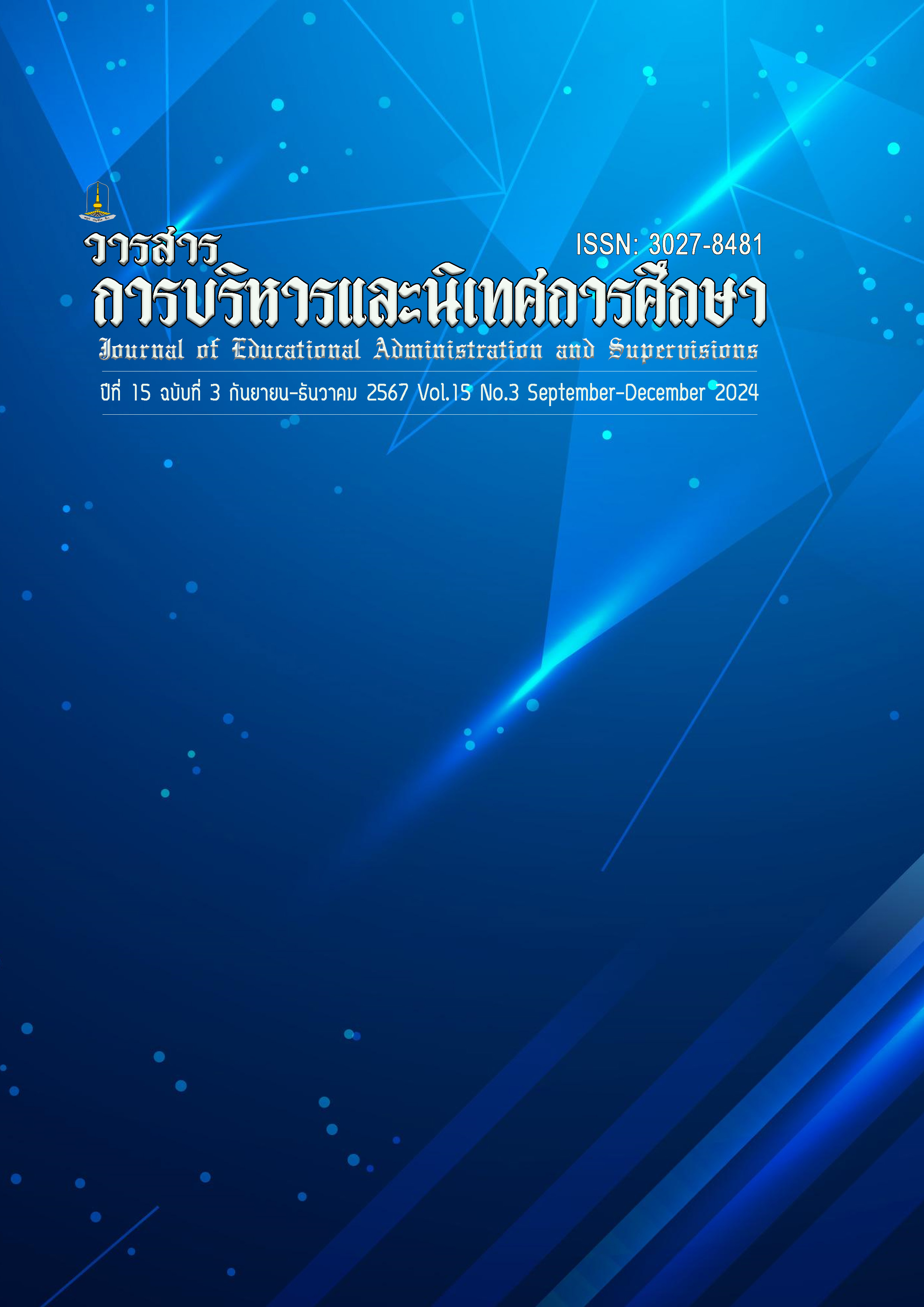The Development of Learning Model to Enhance Responsibility for Teacher Students in Faculty of Education, Ubon Ratchathani Rajabhat University
Main Article Content
Abstract
This research aimed to develop a model and study the results of using learning model to promote student responsibility. The sample group was selected by cluster random sampling, consisting of first-year students, Faculty of Education, Ubon Ratchathani Rajabhat University, who studied the Philosophy of Education and Professionalism course in the first semester of the academic year 2024, consisting of 1 group and 28 students by Cluster random sampling. The research instruments consisted of 1) 6 learning management plans, 4 hours each, totaling 24 hours; 2) a responsibility assessment form for students to self-assess, a 5-level rating scale assessment form with 10 items; 3) a questionnaire on satisfaction with the learning management model, a 5-level rating scale with 15 items; and 4) a reflective record form, which was an open-ended question about the results of the learning management tasks, with 4 items. Data were analyzed using mean and standard deviation, t-test and content analysis.
The research results found that 1) the learning model that promotes student responsibility consisted of 4 components: principles, objectives, activity organization steps, and evaluation. There are 6 steps in learning management, namely “SPIRIT”, which are (1) Set goal (2) Design learning pathway (Plan) (3) Implement (Implement) (4) Review and improve (Review) (5) Evaluate success (Identify) and (6) Accept and change (Transform). 2) The results of using learning activities that promote student responsibility found that 2.1) Students had higher self-responsibility assessment scores after studying than before studying. Statistically significant at the .05 level. 2.2) Students were highly satisfied with the overall learning management model. 2.3) The results of reflection found that students thought, reflected and communicated about their learning after performing tasks that showed their knowledge of the work, self-awareness, and appropriate learning strategies. They used this to set goals for planning, reviewing, evaluating and accepting the results of the work and then used this to adjust their own learning for further development.
Downloads
Article Details
References
ทิศนา แขมมณี. (2560). รูปแบบการเรียนการสอน (พิมพ์ครั้งที่ 21). จุฬาลงกรณ์ มหาวิทยาลัย.
ทัศนา ประสานตรี. (2555). การพัฒนารูปแบบความเป็นครูของนักศึกษา มหาวิทยาลัยนครพนม. วารสารมหาวิทยาลัยนครพนม, 2(3), 25-32. https://so03.tci-thaijo.org/index.php/npuj/article/view/54446
นงเยาว์ อุทุมพร. (2564). การพัฒนารูปแบบการจัดกิจกรรมเพื่อเสริมสร้างพฤติกรรมคุณธรรมจริยธรรมสำหรับนักศึกษาคณะครุศาสตร์ มหาวิทยาลัยราชภัฏธนบุรี. วารสารศึกษาศาสตร์ มสธ, 14(2), 105-119. https://ir.stou.ac.th/bitstream/123456789/487/1/44241.pdf
ปริญา ปริพุฒ. (2559). การพัฒนารูปแบบการเรียนรู้ตามแนวคิดการเรียนรู้ส่วนบุคคลเพื่อส่งเสริมความเป็นผู้เรียนรู้อย่างเชี่ยวชาญ [วิทยานิพนธ์ปริญญาดุษฎีบัณฑิต ไม่ได้ตีพิมพ์], มหาวิทยาลัยมหาสารคาม.
ปารีญา ราพา และ ฉัตรวิไล สุรินทร์ชมพู. (2565). การพัฒนาความรับผิดชอบด้านการเรียนแบบออนไลน์โดยการใช้โปรแกรมการกำกับตนเองของนักศึกษาวิชาชีพครู. วารสาร มจร อุบลปริทรรศน์, 8(2), 799-808. https://so06.tci-thaijo.org/index.php/mcjou/article/view/267123
ปิยาภรณ์ พุ่มแก้ว. (2562). การพัฒนารูปแบบการจัดการเรียนรู้เพื่อเสริมสร้างความสามารถในการสะท้อนคิดของนักศึกษาครู. วารสารการวัดผลการศึกษา มหาวิทยาลัยมหาสารคาม, 25(1), 188-205. https://so02.tci-thaijo.org/index.php/jemmsu/article/view/199140
ปรีชา ธนะวิบูลย์ จีรภัทร อาดนารี และนงเยาว์ อุทุมพร. (2565). การพัฒนารูปแบบการจัดกิจกรรมเพื่อเสริมสร้างพฤติกรรมคุณธรรมจริยธรรมด้านความซื่อสัตย์สุจริต สำหรับนักศึกษาคณะครุศาสตร์ มหาวิทยาลัยราชภัฏธนบุรี. วารสารวิจัยราชภัฏธนบุรีรับใช้สังคมสถาบันวิจัยและพัฒนา มหาวิทยาลัยราชภัฏธนบุรี, 9(1), 1-16. https://so02.tci-thaijo.org/index.php/DRURDI/article/view/257448
ไพฑูรย์ สินลารัตน์, นวลจิตต์ เชาวกีรติพงศ์, ชัยวัฒน์ สุทธิรัตน์, ทวีศักดิ์ จินดานุรักษ์ และไสว ฟักขาว. (2562). คิดรับผิดชอบ : สอนและสร้างอย่างไร (พิมพ์ครั้งที่ 2). วิทยาลัยครุศาสตร์ มหาวิทยาลัยธุรกิจบัณฑิตย์.
มาตรฐานคุณวุฒิระดับปริญญาตรี สาขาครุศาสตร์และสาขาศึกษาศาสตร์ (หลักสูตรสี่ปี) พ.ศ. 2562. (2562, 6 มีนาคม). ราชกิจจานุเบกษา. เล่ม 136 ตอนพิเศษ 56ง . หน้า 12.
รานี ลิ้มเจริญ. (2564). ผลของการใช้กิจกรรมพัฒนาผู้เรียนโดยใช้แนวคิดการกำกับตนเองเพื่อเสริมสร้างวินัยด้านความรับผิดชอบของนักเรียนชั้นประถมศึกษาปีที่ 3 โรงเรียนเชิงกระบือ. วารสารการวัดผลการศึกษา, 38(104), 82-93. https://eptb.swu.ac.th/jemeptb_vol-38-104/
สายใจ ระดมสุข. (2566). การศึกษาความรับผิดชอบของนักศึกษาระดับปริญญาตรีมหาวิทยาลัยเกษมบัณฑิต. วารสารเกษมบัณฑิต, 24(1), 47-64. https://so04.tci-thaijo.org/index.php/jkbu/article/view/242063


